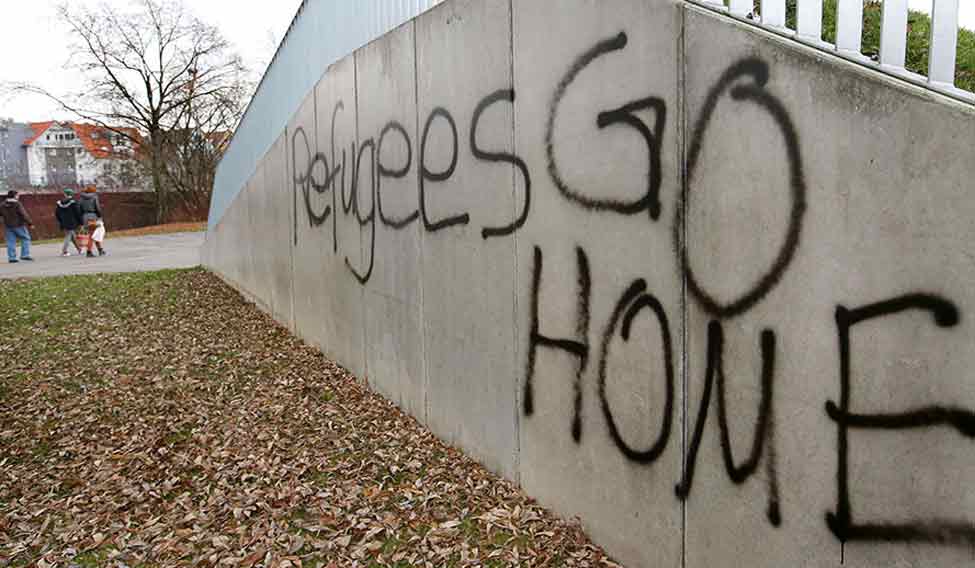When one of Berlin’s most popular gay clubs recently held a fund-raising party for refugees, Vivien Roos took along a group of young Afghans and Syrians.
There had been a long discussion at the asylum home where she volunteers about the wisdom of this idea. But Roos, a true Berliner who is not easily fazed, was confident that the cultural gap between rural Afghanistan and urban Germany could be bridged.
By and large she was right: The men politely declined alcoholic drinks and mingled happily on the dance floor. It was only when two German men started having sex in plain sight that Roos rushed her group outside.
“One of the boys asked me, ‘What’s that?”’ she said. “I just held my hand over his eyes.”
For many of the migrants, Germany is seen as the promised land: A place of stability, healthy economic growth and, so far at least, a warm welcome. But it is also a country where pork sausage is a national dish; where the leader is a woman; where even the smallest derogatory reference about Jews is taboo; and, well, where very occasionally men have sex in a nightclub.
 German President Joachim Gauck (R) shakes hands with migrants as he visits an accommodation for refugees in Bergisch Gladbach, western Germany | AFP
German President Joachim Gauck (R) shakes hands with migrants as he visits an accommodation for refugees in Bergisch Gladbach, western Germany | AFP
More than a million migrants are expected to have arrived in Germany over the course of 2015, and many are expected to stay for good. The challenge of integration goes beyond the already enormous tasks of teaching them the language and finding them jobs. Germans who are in direct contact with the new arrivals tell of culture shock—sometimes frivolous, sometimes serious—on both sides.
At a temporary home for male teenage refugees in the southeastern city of Passau, a German teacher recounted how a 15-year-old boy from Afghanistan refused to touch his food at lunch. Asked why, he explained that he would not eat as long as a woman was sitting at the same table. “Dogs don’t eat at the table, either,” he said matter-of-factly.
Others adapt more quickly. At the same asylum home, whose entrance is adjacent to a popular German sex accessory chain, the mannequins in the shop window that initially caused embarrassment soon became a popular backdrop for noisy selfies.
Sometimes there is little to laugh about. Near the German-Austrian border, an Arabic-speaking volunteer was translating when she noticed a woman with a badly bruised face. “Did you do that to her?” the volunteer demanded of the woman’s husband. He did not answer, but smiled with what the volunteer described as visible discomfort. “You’re in Germany now,” she recalled telling him. “You have to be a good man and observe the law.”
In Dortmund, an Iraqi refugee who was waiting to register his asylum claim got into a heated argument with another migrant about the Israelis and the Palestinians. The Jews, he concluded, were responsible for much of the suffering of Arabs. A charity worker of Moroccan origin explained to him, in Arabic, that such attitudes were not acceptable—particularly in Germany.
The country has been through something similar before, when “guest workers,” most notably from Turkey, were invited to fill a temporary labour shortage in the decades after World War II. Little effort was made to smooth the cultural transition, creating a problem when many decided to stay.
Chancellor Angela Merkel says she wants to make sure the mistake is not repeated. Her government pays for refugee “integration classes,” and many schools conduct “welcome classes” for refugee children, teaching them not just the language but about life and values in Germany. A new book, published in German and Arabic and sponsored by a foundation linked to Merkel’s conservative party, lists some vital survival tips for newcomers: Don’t be late. Shake hands. And learn how to say “I don’t eat pork” in German.
Roos, the volunteer in Berlin, is hoping it will all work out. The only way to integrate people from very different cultures into Germany is to expose them as much as possible to “real life in Germany”, she said.
Would she risk another outing to a gay club? “Absolutely.”






